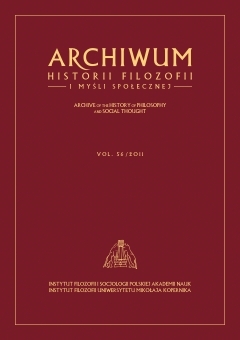Kultura a odpowiedzialność człowieka Na marginesie eseju Ernsta Cassirera Naturalistyczne i humanistyczne uzasadnienie filozofii kultury
Culture and Human Responsibility
Author(s): Karol ChrobakSubject(s): Philosophy
Published by: Instytut Filozofii i Socjologii Polskiej Akademii Nauk
Keywords: Cassirer; man; culture; naturalism; humanism;
Summary/Abstract: This article is an introduction to Ernst Cassirer’s essay Naturalistic and Humanistic Justification of Philosophy of Culture. At the beginning the biographical background of its emergence is outlined. Hitler’s rise to power forced Cassirer to emigrate to Sweden. This difficult situation induced him to substantially rethink the ethical dimension of his philosophy of symbolic forms. In the essay Cassirer distinguishes two currents of modern philosophical reflection about man and culture: the naturalistic and the humanistic one. The former considers culture as a result of purely natural processes that run completely independently of any human decision. Such an approach reduces man to “a marionette” that is blindly obedient to external impulses. According to Cassirer such a way of thinking characterizes Hegel’s idealism, Taine’s positivism as well as Spengler’s fatalism. These different naturalisms he contrasts with a humanistic approach to the philosophy of culture where man turns out to be an active, creative being that produces around himself his own world of culture. Following Cassirer I explain this “new humanism” with reference to the philosophy of Johann Gottfried Herder and Wilhelm von Humboldt. The conclusion that Cassirer draws from their reflections is that culture is the field of manifestation of man’s inexhaustible power of form giving. Although this power is always ascribed to an individual it is realized in a social context of a particular community.
Journal: Archiwum Historii Filozofii i Myśli Społecznej
- Issue Year: 56/2011
- Issue No: 56
- Page Range: 305-315
- Page Count: 11
- Language: Polish

